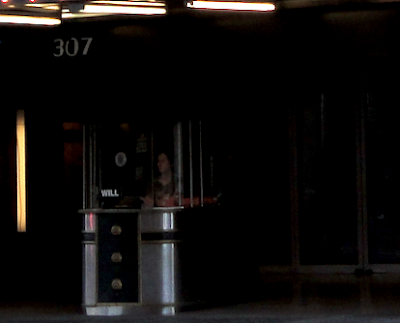KINO SLANG
QUARANTINE
PRESENTS
PRESENTS
CORNEILLE–BRECHT
2009. Jean-Marie Straub.
France, Mini-DV, 4:3, color.
26 minutes x 3 versions, A, B, C; total: 80 minutes.
(Version C subtitled in English by Misha Donat and Straub)
Texts: Pierre Corneille, Horace (1640) and Othon (1664);
Bertolt Brecht, Das Verhör des Lukullus
(The Trial of Lucullus), radio-play, 1939-40.
Production: July 2009, Straub's Paris apartment.
Acknowledgment: Jean-Claude Rousseau, Barbara Ulrich.
Image: Christophe Clavert (Panasonic AG DVX-100)
Cast: Cornelia Geiser
SYNOPSIS
In leaps of physical color and sound, Cornelia Geiser recites verses from two of Pierre Corneille’s Roman plays, Horace and Othon ("As for the school of dialectics, well, Corneille is nevertheless the greatest..." said Straub), followed by verses from Bertolt Brecht’s 1939 radio play The Trial of Lucullus, a powerful recitative on war-crimes in fourteen short pieces (never broadcast; later turned into an opera by Brecht and Paul Dessau in East Germany).
In the Lucullus play, which Brecht said at the time "more or less reaches the limit of what can be said" in oppressive times, a Roman General is summoned to the netherworld to stand trial for the crimes and sufferings he has inflicted on the common people and slaves. A giant frieze is hauled in and analyzed for the variety of life seen plundered there.
Across centuries of Western civilization, Straub and Geiser bridge these texts of different epochs and––in a single corner of a small Parisian apartment––confront the barbarous rulers of ancient Rome, the kings of 17th-century France, the fascists of Europe in the 1930s and 1940s, and, by implication, those in power today.
Cumulatively, it is not the rulers who are the main characters here, but the collective judgement of the oppressed upon the oppressor.
*
"'Maybe it's not even a movie,' Straub wondered aloud during a post-screening talk on one of his later videos, CORNEILLE-BRECHT (2009). As a continuation of a 'search for degree zero' (Luc Moullet’s phrase, from a recent appreciation) indeed this movie is 'just' a woman, Cornelia Geiser, reading a text frontally to the camera in the same corner of Straub's Parisian apartment (once Huillet's mother's) that we will see several times in our program. But the words and their drama and intonation invoke massive friezes, ultimate judgments, conflagrations, the 'collective hate' of Rome, 'the sole object of my resentment' (Corneille; the words in French, 'Rome, l'unique objet de mon ressentiment'' will ring in the ears of anyone who sees all three versions of CORNEILLE-BRECHT in succession, as it was meant to be seen), then goes down even deeper (with a Brecht radio play), down to a Hades where a trial for war crimes is taking place against an imperialist, perhaps the same imperialist, perhaps any imperialist. It would be foolish to call this picture minimalist, for even if its sound were turned off one could be fascinated by the changes of color in wardrobe and sunlight, here effected by jump cuts––yet another cinematographic vein Straub has tapped for both sudden and gradual excitation. Fascination, magic, and belief are part of Straub-Huillet's cinema too, occurring amid their total opposite––analysis, critical faculty, and errant thought––and back again. One may feel upon leaving the theater a sharpening of the senses."
––Excerpt from the Introduction to
Huillet/Straub series at the Bijou Theater (CalArts), 2017
programmed by Andy Rector and Mark Bogle
*
This is the premiere showing of a new 1080p copy of
CORNEILLE–BRECHT from the original miniDV source.
The movie will be available for viewing here at
Kino Slang throughMay 10, 2022 >May 16, 2022 (run extended!).
We present all three versions of CORNEILLE-BRECHT–– A, B, and C.
Only C is subtitled (in English). Past screenings have often presented all three versions together, one after the other, with only one version subtitled.
Further articles on CORNEILLE-BRECHT and an Interview with Christophe Clavert (cinematographer of eleven of Straub's digital video films, collaborator, and actor in LA FRANCE CONTRE LES ROBOTS) are to come.
For now, the film...
... HERE
*
With huge thanks to Jean-Marie Straub, Barbara Ulrich, and Christophe Clavert, who offer this movie to us today with the words: "Ce serait notre commentaire à la situation politique actuelle."
Further thanks to Olivier Boischot, Ryan Krivoshey, Ricardo Matos Cabo, and Nora Sweeney.
*
This Kino Slang presentation of films online is a continuation of what began during lockdown and quarantine in 2020 with the world premiere of LA FRANCE CONTRE LES ROBOTS (Straub, 2020) followed by a Godard/Buñuel program of the short "What's Wrong with the World?" (1996) and IT'S CALLED THE DAWN (1955).
The time in between has been a difficult one, including the loss of our venue for physical cinema screenings, the Echo Park Film Center in Los Angeles, where from 2017-2020 we projected double-bills and shorts programs of Maurice Tourneur, Jean-Luc Godard, Boris Barnet, Jerry Lewis, Alfred Hitchcock, Edgar G. Ulmer, Pedro Costa, Jacques Tourneur, Aleksandr Dovzhenko, Charlie Chaplin, Jean Renoir, Luis Buñuel, João César Monteiro, Esfir Shub, Joris Ivens, Pier Paolo Pasolini, Carl Dreyer, and Yasujiro Ozu.
We now continue, and keep the name "quarantine" for those still confined.
*







No comments:
Post a Comment